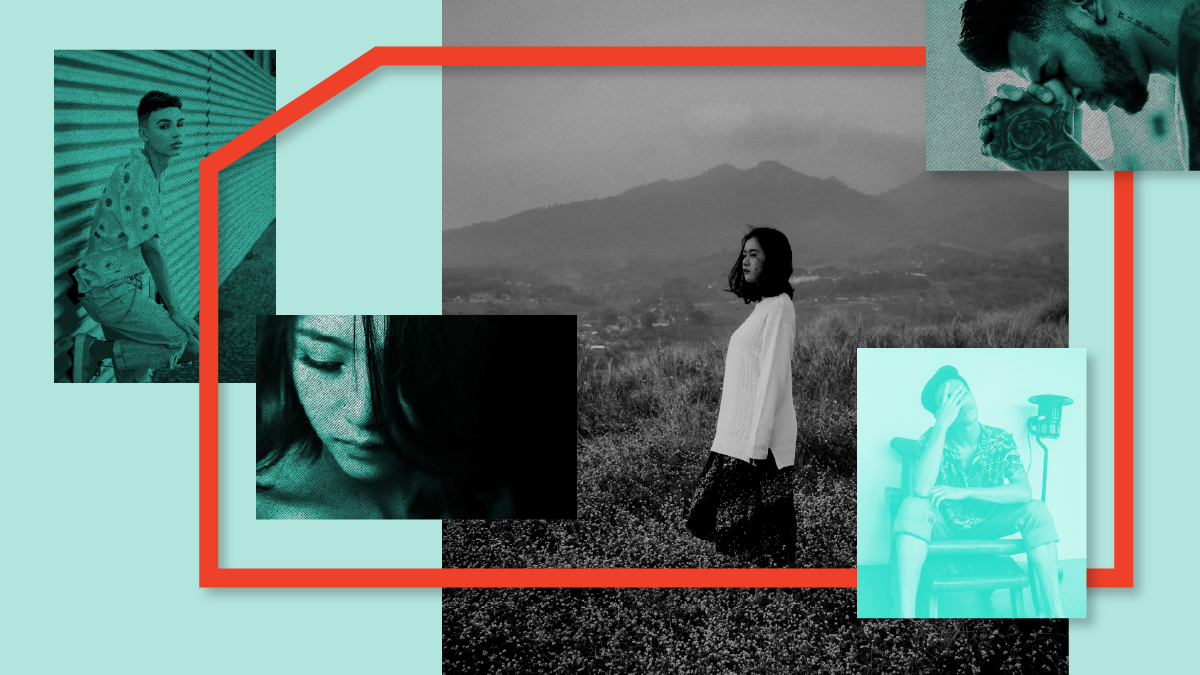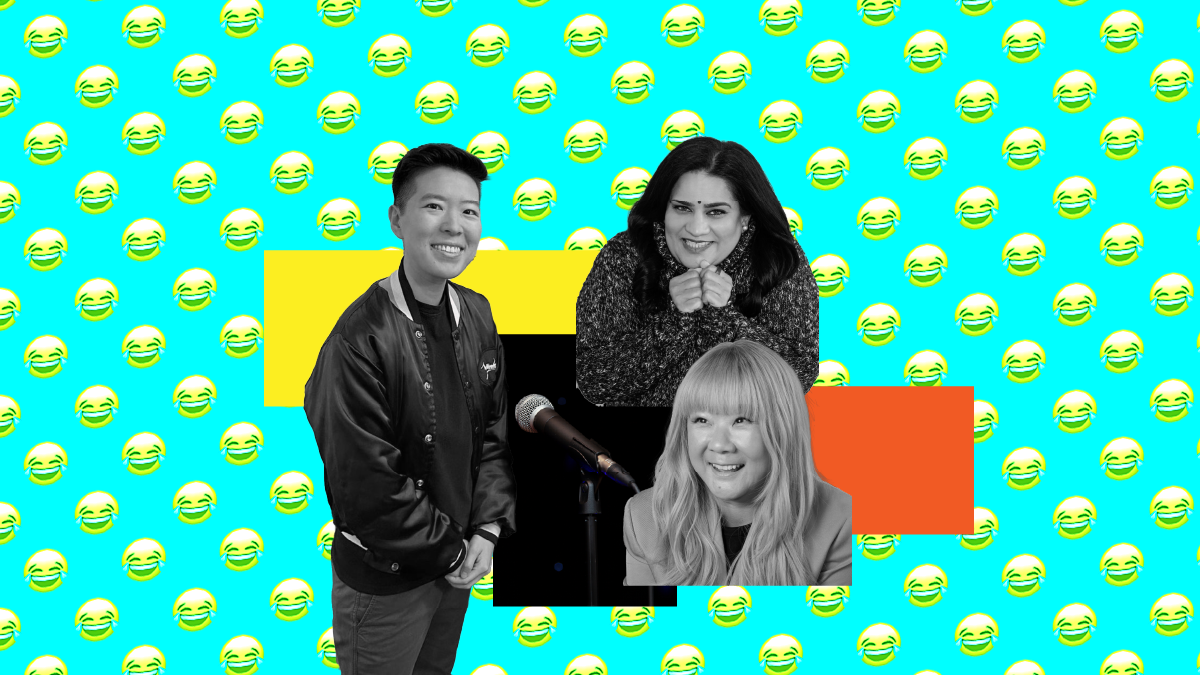“Telling people means I’m weak; it means I can’t; it means I failed”: Six Women of Color Share Their Experiences with Mental Illness—and the Stigma It Can Carry
To mark the end of BIPOC (Black, Indigenous, and People of Color) Mental Health Awareness Month, six women of color from our Sparking Change storytelling initiative gave voice to their lived experiences of mental illness and the stigma it can carry within their communities.
Learn more about our initiative, and these incredible women, here.
Content warning: Domestic violence, depression, suicidality, trauma.
We Must Nurture Ourselves
By Patricia Bustillos R
From my experience, depression is a process and extended moments of deep sadness.
When I was growing up, my father abandonded my family—and my son’s father has done the same thing to us. It hurts me very much to know that we both have experienced this loss. But with many therapy sessions and antidepressants, I have noticed, paid attention to, and identified changes in me and my son, so I can help support us through this journey.
Unfortunately, understanding and taking care of your mental health is not very common in our Hispanic culture. Many of us go through difficult events, yet we do not seek to nurture or understand ourselves. My aunt, for example, has dementia and depression that she never attended to or understood. I believe that’s, in part, because of a lack of or bad mental health education. I think, starting when we are young, we should have access to psychologists, so we can see how mental health affects us as we go through crises or events in our lives.
Personally, because I’ve had depression in the past, today I am able to recognize when I am getting depressed again—and I now know how to respond and cope. I choose to do things that I enjoy and to educate myself to be well mentally. And above all, I feed my mind and my body.
I Did Not Have Time to Fall
By Sandra Ibarra
When I thought about writing this, I thought of a young man whom I love with all my soul—and who, for five years, has suffered from depression.
Five months ago, I arrived at my parent’s house, and he summoned the whole family to talk about his illness. Everyone was silent; nobody said anything; the whole family just murmured in confusion, wondering how it could be that he still suffers from depression; that he left school after being an excellent student with all A+s; that he does not want to work; and that he only wants to be locked in his bedroom.
We just did not understand.
But in that conversation, he helped us to understand the difficult moment he was going through. He told us about all the time he spent without being able to sleep, without wanting to live—until he was about to take his own life with a gun to his head.
I was in shock.
How could it be that little boy whom I had held in my arms since he was born even thought about taking his own life? And I, as an adult, could not do anything to make him come to his senses?
I felt very bad for not having been able to do anything to make this boy feel better. I felt bad for having judged him without trying to understand what he was going through. But sometimes, it is difficult to feel empathy for others because we have all gone through such different circumstances that we only see things from our perspective.
In my life, I had been educated about mental health in a different way. They told me that if I fall, I have to get up. For me, it was never possible to collapse and throw myself into tears without fighting to move forward, because I had to fight for my life, because I did not have time to fall.
I always tried to be strong because my childhood was a bit difficult. And despite feeling rejected not only by my father but also by his family, I felt inside me there was always an inner strength that took me forward. It’s almost like, without you knowing it, life is prepping and strengthening you to face all the moments in the future that will cause you pain.
For example, after marrying my great love, I fought so hard to become a mother. I had several inseminations with no success, and when the gynecologist told me that it would be the last attempt, I felt such a hard pain in my heart. I did not know that I was falling into a great depression; I always fought to move forward by myself, but now I could not do it. When I eventually decided to seek therapy, I thought why had I not come before?
Therapy helped me to accept that I could not have children, but that my life continued, and I could continue to be happy with my husband and my family. But then, out of nowhere, I found out that I was pregnant. That was a very confusing day for me but at the same time wonderful. And despite the ups and downs in my marriage, I felt happy and fulfilled, that was the icing on my beautiful cake, but happiness does not last forever.
When I was six months pregnant on the way to my baby shower, I received a message from my husband saying things that I did not understand. A message for his love—but I immediately realized that this message was not for me; it was for another love that I was not aware of. My world was falling apart; my happiness was being completely destroyed. I wanted to believe his lies, but at the end of my pregnancy, I knew that everything would come to an end. He did not want to come to the United States with me to give birth, and I was gradually submerging myself in a great depression. Although I went to therapy, my pain remained so deep, and I came to think terrible things; but seeing the face of my baby saved my life because I knew that now I should not only fight for myself but for that beautiful little one.
Once I had my son, I stayed at my job because it gave me the opportunity to get overtime, and I felt that my son would be fine in the nursery. But every week, when Friday came, I opened the gate of my house, parked my truck, and when I opened the car door to lower my baby, I collapsed in such a way that just remembering it makes me cry. I cried so much that I couldn’t even unbuckle my seat belt. When I managed to get back up, I would come into my house, sit in the living room, and feed my son. But when he fell asleep, I just cried and cried and felt so much sadness inside my being. That’s how I spent my Saturday and my Sunday. On Monday, I had to be strong again and go back to work as if nothing happened. I didn’t want anyone to notice my situation, not even my family, and much less my parents who were far away from me. I didn’t want to worry them, despite the fact that I needed them, because I couldn’t prove to anyone that I was weak. I had to fight against all my feelings with all my willpower, but my son and God took me by his hand and little by little I was able to move forward.
Depression is a terrible thing, and it’s something we need to learn more about. We need to create a mandatory class at school so that young people, like the young man I know and love, understand that they are not alone—and that there is always someone they can ask for help.
Let’s become aware of depression as a disease; let’s be empathetic with those who need us; let’s understand that sometimes we can pretend that we are happy when really, we are going through a terrible situation. Although it is difficult to face, we must ask for help—because our lives are worth so much, and because we cannot be defeated in the face of adversity.
A few days ago, I talked to that young man again, and I realized that, little by little, he is feeling better. He is not one hundred percent, but at least he no longer hears the voices in his head that tell him he is useless, that he doesn’t deserve to live.
I am proud of myself for being what I am, I am proud of my family and that child who always obtained pure A+ in his studies. As he grows up, I want to be able to continue being there for him, because I know that he will always be my little warrior. And I hope that one day he feels truly happy—that one day he has a better life.
Becoming Mentally Healthy
By Chantelle Mitchell
Growing up in an African American home, mental health was never addressed—let alone talked about. If you said you were hearing voices, feeling down, or couldn’t explain your emotions, you were told to simply “pray” about it. God will fix it! This left you in a place of feeling alone or keeping your emotions bottled up inside with no hope of getting rid of them.
It wasn’t until I was 39 years old that I knew that something was wrong with me. I got into an argument with my daughter’s father, and I felt so full of rage. I couldn’t express how I felt without wanting to destroy something. Why was I feeling this way? For years, I had struggled with expressing my emotions, fought depression from years of trauma, and also dealt with postpartum depression. I wanted these feelings to stop, which is why I eventually sought therapy—to try and find the root cause of my problems. I’ve been seeing a therapist for three years now, and so have my children.
Therapy has helped my children and I heal through the various traumas we have experienced. We’ve become more assertive, rather than passive or aggressive, with one another. We now listen to understand, rather than to just respond. We know how to set healthy boundaries, apologize, and hold ourselves accountable for our responses or our actions. And finally, we are okay with saying: “Today is not a good day for me.”
I make it my duty to talk about mental illness and mental health because so many people are suffering alone, and they don’t have to. We as African Americans no longer have to be ashamed of the stigma of mental illness. Yes, we can “pray” about our mental health—but God alone cannot fix it. We must encourage each other to seek the help that we need: Seeking a therapist, a psychiatrist, family therapy, etc. are just a few options out of the many mental health services that are available to us.
Mental illness is a subject that we no longer have to feel ashamed of. We’re all impacted by mental health, so let’s support one another on our journeys to become mentally healthy.
I Got Up Only by Inertia
By Patty Ortiz
I am 35 years old, and I come from a culture where crying was only for the weak.
In my first marriage, I lived through domestic violence. For me, this experience was “normal” because it was part of my childhood; I was taught that love can do everything, marriage was for life, and choosing my partner, always over myself, was a priority. But inside, I felt completely empty. After seven years of being with this man, he hurt me so badly that I had to go to the hospital. At that time, I had a two-month-old baby and a six-year-old daughter—who pleaded with me to leave. And we did. I also went to therapy, which helped me to keep going.
Over ten years, I rebuilt my life, marrying a wonderful, patient, loving, authentic, and funny man. But then, my husband and my brother passed away—when I was six months pregnant, expecting my third baby.
I was left with immense pain; my world became dark; I got up only by inertia. My soul hurt deeply, even breathing cost me, and I felt dead in life. I started going to therapy, but it wasn’t enough. That immense pain did not allow me to see beyond; I was sunk in resentment and denial. It took me three months to recognize that I could no longer do it alone, and I agreed to take medication for depression. This medicine helped me see my world more colorfully, more clearly. With that added help and continued therapy, I managed to understand that I only have control over my own actions—and that by reconciling with my past and with myself, I could move forward and leave my burdens behind.
My dream is that mental health classes will be implemented in schools across our country. That from kindergarten through high school, children will be taught to identify and recognize all of their emotions. That they will have the tools to evaluate themselves—without feeling weird, crazy, or different.
What I Can’t Say Out Loud
By Raynique Syas
Sometimes it feels like I am in a hospital bed and I am struggling to breathe. The doctors are trying to resuscitate me and it isn’t working. I keep coding. They keep shocking me. I can hear, I can see. But I can’t breathe. That’s what anxiety feels like.
It feels like being severely overwhelmed without a way to release. Holding all of your emotions inside for long periods of time can cause anger, depression, anxiety, and loneliness. Be strong! Suck it up! Get over it! Bottling up your thoughts, your emotions, fears and tears. Hiding pain, rage, hurt, distrust, abuse, and shame behind the cover of strength, hard work, and determination—until you are so full of negative pressure that you just burst with emotion, rage, and pure restlessness. But I can’t tell my friends and family how I feel. Telling people means I’m weak; it means I can’t; it means I’ve failed.
Moonlight Dread
By Felicitas Torres
In my childhood I always felt sad, and I didn’t know why. It was an emptiness, an absence, an emotional lack. The word depression didn’t exist in people’s vocabulary at that time, so I couldn’t identify the reason for my sadness. But later, I learned that it began when I was 3 years old—right after my father abandoned us.
My entire childhood, I heard my friends talking about their parents, and I couldn’t understand why I didn’t have a dad. This hurt me so much. I grew up with a lot of fears and sometimes I didn’t want to live.
Something that marked me—and continues to mark me to this day—is the dread I have of the moon. I do not know why I was terrified of being outside, but I felt that the moon with its light would make me disappear. Listening to the elderly talk about the full moon made me especially sad, because I could never turn to the sky to see it. I thought that, if I did, the moon would take me away. Take me with it. I wanted to shout my fears to the world, but I was afraid they would call me crazy, so I didn’t discuss any of this with anyone.
Many years ago, I read an article that said in the 70s we were just beginning to talk about psychological theories, like depression being a disease, but the information came very slowly. What gives me hope is the fact that in this 21st century the words depression and anxiety have become normalized, and finally, action has been taken to help those in need. Those like younger me—who was afraid to look up at the moon.




